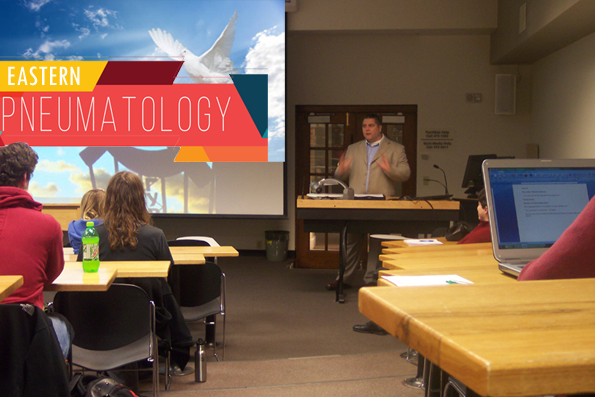The Non-Chalcedonian Eastern Church: Coptic

Dony K. Donev, D.Min.: Eastern Pneumotology Lectures
Eastern Orthodoxy can be expressed in one word: theism. The purpose and meaning of life is to become more like God. Deification is pursued by all means of human existence. This quest for divine likeness often includes the typical for the Eastern Church, speculation on the divinity and humanity of Christ, traditions on the doctrine of the Trinity and non-traditional mystical experiences. They appear in the context of both physical and spiritual characteristics in individual and corporate ecclesiastical environment. The role of the Spirit in the process of deification is threefold and involves: creation, re-creation and theism. Eastern Pneumotology follows the graduate process of theism development. The Spirit is involved in the original creation of the world as well as the new-birth experience. His work however, does not end there, but continues throughout the process of personal deification of the believer.
The Non-Chalcedonian Eastern Church: Coptic
The connection between the Egyptian Church and the Holy Spirit can be traced back all the way to the birth of Jesus in the beginning of the Gospel narrative. Following the early ecclesiastical history, the development of the church continues with the desert fathers, among who Anthony of Egypt is a prime example.
In this context, the Coptics focus on anointing with oil, laying on of hands, and even laying on of the Bible or other holy objects on the sick person as a healing method. Because of their teaching about the connection between demons and deceases, exorcism is practiced along with healing.[1]
This is consistent with the writings of one of their prime writers by the name of Shenoute of Atripe (4th-5th century), who believed that the Holy Spirit is a life-giving force needed in order to obtain victory in both the spiritual and material worlds.[2] Impacted by the problems of the monastic life, his theology further reflected on the Spirit as “a consistent vigilance.” [3]
The Spirit is also the one who maintains the walls of the individual’s heart. In this sense, the spirit is the agent of continuous victory in the life of the Christian. Shenoute’s teaching of momentarily and continuous victory is similar to what we consider today as sanctification of the believer. This is further revealed in his belief of the fruits of the Spirit being manifested as a result of the believer’s victory over evil.[4] This element of Shenoute’s credo integrates a continuation with the previously discussed positions on the fruit of the Spirit by Maximus the Confessor and Gregory Narek.
Even wider range of mystical experiences in the context of the Coptic Church is provided by Pseudo-Macareus (4th c.). In his view, the Spirit is the one who nourishes the Church, and as such He is also the source and the provider of the pneumatic experiences.[5] Similar to John Cassian, he describes the Spirit in the means of light and “inflammation.”[6] In his description of the pneumatic experience as ”intoxication,” Pseudo-Macareus is consistent with the previously discussed example of Isaac of Nineveh.[7] Analogically to Symeon the New Theologian, Pseudo-Macareus claims that the above experience is strictly personal.[8] And along with John Cassian, Maximus the Confessor, Seraphim Sarov, Narsai and many others he holds “that a true communion with God is possible only as an individual takes time to enter a quite place for solitary prayer.”[9]
[1] Otto F. A. Meinardus, Christian Egypt: Faith and Life (Cairo: American University Press, 1970), 224.
[2] Johannes Leipoldt and W. E. Crum, eds., Sinuthii archimandritae vita et opera omnia, CSCO 73 Coptic 5 (Paris: e Typographeo reibulicae, 1913; reprint Louvain, imprimerie orientaliste L. Durbecq, 1954), 12-.31-32.
[3] Dimitri Cozby, “Abba Shenute of Atripe: First Homily on the Patriarchs,” in Dwight W. Young, ed., Studies Presented to Hans Jacob Polotsky (Bacon Hill: Pirtle and Polson, 1981), 17-20.
[4] Leipoldt and Crum, 81.2-21.
[5]Granville Penn, Institutes of Christian Perfection (London: John Murray, 1816), 5.12.
[6] Ibid., 5.4.
[7] Inst., 66.
[8] Burgess, 148.
[9] Ibid.








Comments